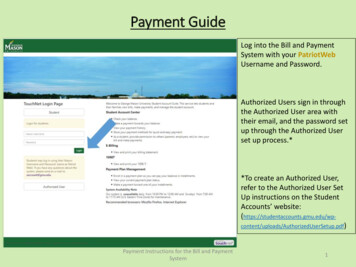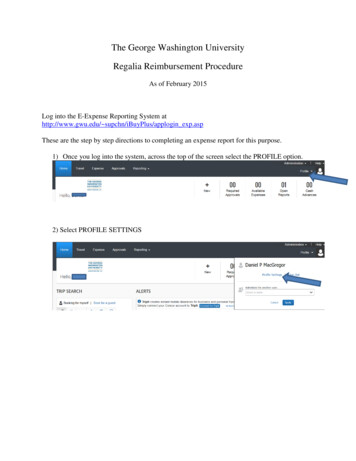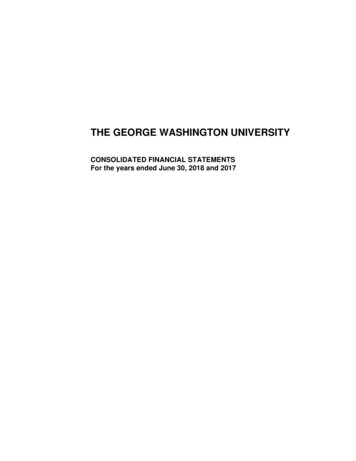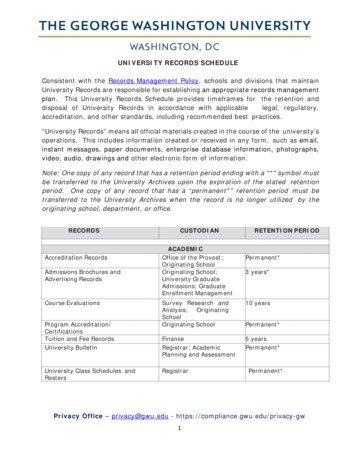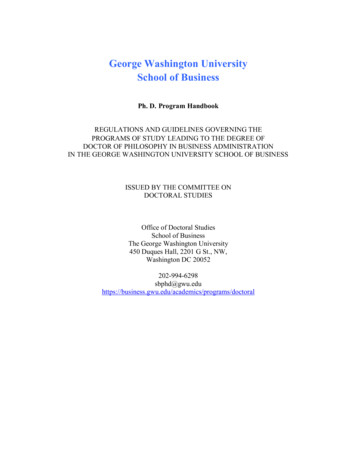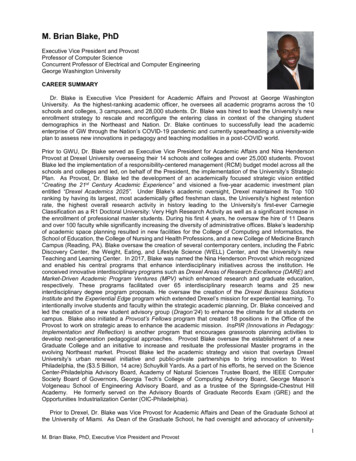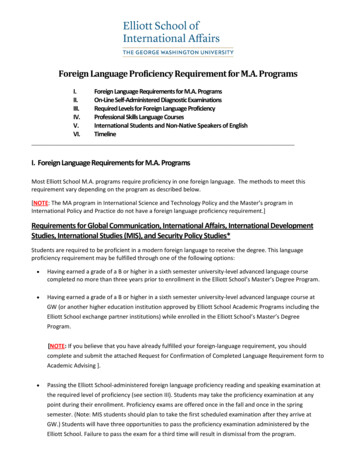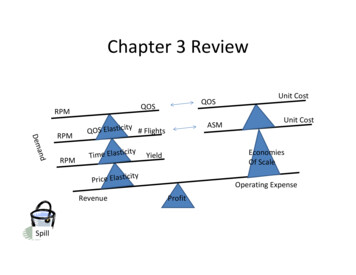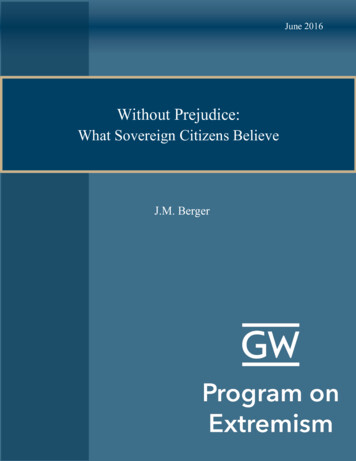
Transcription
June 2016Without Prejudice:What Sovereign Citizens BelieveJ.M. Berger
Program on ExtremismThe Program on Extremism at George Washington University provides analysis on issues relatedto violent and non-violent extremism. The Program spearheads innovative and thoughtfulacademic inquiry, producing empirical work that strengthens extremism research as a distinctfield of study. The Program aims to develop pragmatic policy solutions that resonate withpolicymakers, civic leaders, and the general public.About the AuthorJ.M. Berger is a fellow with George Washington University’s Program on Extremism. He is aresearcher, analyst, and consultant, with a special focus on extremist activities in the U.S. anduse of social media. Berger is co-author of the critically acclaimed ISIS: The State of Terror withJessica Stern and author of Jihad Joe: Americans Who Go to War in the Name of Islam, thedefinitive history of the U.S. jihadist movement. Berger publishes the website Intelwire.com andhas written for Politico, The Atlantic, and Foreign Policy, among others. He was previously anon-resident fellow with The Brookings Institution, Project on U.S. Relations with the IslamicWorld, and an associate fellow with the International Centre for the Study of Radicalisation.The views expressed in this paper are solely those of the author, and not necessarily those of theProgram on Extremism or the George Washington University.1
AbstractWhen surveyed, United States law enforcement consistently ranks sovereign citizens as the topdomestic extremist threat, even greater than that presented by homegrown jihadists.1 Despite theconsiderable size of the movement, estimated to include hundreds of thousands of adherents, fewAmericans know what sovereigns believe and how those beliefs inform their actions.2So-called sovereign citizens believe in an alternate history of the U.S., replacing reality with avast conspiracy governed by complex, arcane rules. They believe that if someone understandsand properly invokes those rules, that person is exempt from many laws, including the obligationto pay taxes, and that he or she can be empowered to seize private property, enforce legal actionsagainst individuals, and claim money from the government. When faced with arrest for illegalactions that they believe are legal, sovereign citizens can become violent.What exactly do sovereigns believe? The answer is complicated. There are many variations onsovereign ideology, and while some are more common than others, any two sovereign citizensmight offer different explanations. And the explanations that are offered may seem incoherent topeople who are not immersed in sovereign subculture. Although the movement itself is relativelyyoung, first meaningfully coalescing in the 1990s and growing rapidly since, it is based onbeliefs that go back decades.In order to bring light to this topic, this paper will:1) Outline the basic concepts to which at least a plurality of sovereigns subscribe.2) Provide information on the origins of the most significant sovereign ideas.1Charles E. Loeser, "From Paper Terrorists to Cop Killers: The Sovereign Citizen Threat," North Carolina LawReview 93, (2015): 1106.2Michelle Theret, "Sovereign Citizens: A Homegrown Terrorist Threat and Its Negative Impact on South Carolina,"South Carolina Law Review 63, no. 4 (2011): 853.2
A Sovereign History of the United StatesThe most fundamental tenet of the sovereign movement is an alternative version of Americanhistory that roughly accords with the outline given below, along with a set of alternative lawsthat extend from that history.Not all sovereigns understand, subscribe to, or care about every one of these points, but thisbroad narrative is fairly common within the movement. This understanding of history undergirdssovereign ideological beliefs about legal powers and privileges, even if those invoking thosepowers and privileges are unfamiliar with their derivation.To support their beliefs, sovereign citizens frequently cite real laws, but their understanding ofthese laws in context is incorrect, and attempts to take action in accordance with the beliefsoutlined here are almost always illegal, as hundreds of courts have ruled over the course of manyyears.In most cases, sovereigns use multiple synonyms for the terms given here. Sovereigns alsobelieve capitalization and punctuation are extremely important in written law, and they may takeissue with the capitalization or punctuation used here. Concepts outlined below are presented inan order intended to reflect cause and effect, with each building upon the previous.There are no definitive sovereign texts. Rather, adherents draw on a variety of published sources,and increasingly on books, videos, and manifestos distributed over the Internet. Thousands ofpages of content online describe different variations on the sovereign theme. Adherents usuallypick and choose from these elements to create their own individualized beliefs that looselyconform to this general template. Individual sovereign “gurus,” who sometimes presentthemselves as attorneys or judges, also promote specific versions of the sovereign worldview.Fourteenth AmendmentWhile most sovereigns have erroneous beliefs about the Founding Fathers and the early historyof the United States, the most useful starting point for understanding the movement’s alternatehistory is the adoption of the Fourteenth Amendment in 1868.The Fourteenth Amendment, which guaranteed citizenship to slaves freed after the Civil War,states that “all persons born or naturalized in the United States, and subject to the jurisdictionthereof, are citizens of the United States and of the state wherein they reside.”Most sovereign citizens believe this amendment created a form of second-class citizenship, lessempowered and more subject to the federal government, which is seen as distinct from the statecentered form of citizenship articulated in the Constitution. “Fourteenth Amendment citizens”are seen by sovereigns as inferior, limited, or in more extreme views, as slaves. However,sovereigns believe they can opt out of Fourteenth Amendment citizenship by understandingcertain legal provisions and reclaiming their constitutional citizenship.The Fourteenth Amendment also stipulates that the validity of “public debt” of the U.S.government cannot be questioned. In the eyes of some sovereigns, this provision opened the doorto a financial conspiracy starting with the implementation of a commercial legal system3
superseding the previous constitutional system.Common LawSovereigns believe that soon after, and in conjunction with, the passage of the FourteenthAmendment, the U.S. ceased to be a constitutionally governed republic that reflected the will ofthe people. Referred to as the de jure, or legally rightful, government, this original republic wasgoverned under “common law” or “constitutional law.”In the sovereign worldview, “common law” refers to a legal structure that is validated by theConstitution and/or biblical or divine mandate. To sovereigns, common law supersedes theillegitimate laws currently effective in the United States. Beyond this key quality of legalprimacy, the exact meaning, origin, and provisions of common law vary considerably dependingupon the individual beliefs of sovereigns.3Shortly after the unanimous ratification of the Fourteenth Amendment in 1870, sovereignsbelieve, the government was quietly overthrown by corrupt bankers who transformed thegovernment into a corporation and subjected the American people to an entirely new set ofcommercial laws. In the sovereign narrative, this new set of commercial laws usurped theConstitution and overturned its protections for citizens. This corporation is often referred to asthe de facto government and is seen as illegitimate.The vehicle for this change was an 1871 law, which many sovereigns believe created a “UnitedStates corporation” to govern the District of Columbia under commercial code, rather thancommon law. Subsequently, the United States Code—essentially laws compiled to this point—extended this form of corporate rule to the entire country, thanks to a provision in Title 28, §3002 (15) (A) (B) (C) that includes the phrase “‘United States’ means a Federal corporation.”Google searches for this statute overwhelmingly link to sovereign citizen resources, far more sothan actual historical commentary on the law or the context of the section, which refers to alimited use of the term within a specific chapter of the U.S. Code.Commercial LawMost sovereigns make a distinction between “common law citizens” governed under the originalConstitution and “Fourteenth Amendment citizens” governed under the U.S. Code, orcommercial law, and thus subject to the rules of the United States corporation. Some sovereignsrefer to this supposed commercial law as admiralty law, or the Law of the Sea, claiming thisillegitimate law is based on principals of international commerce.Sovereigns consider themselves common law citizens and thus exempt from many federal lawsand other modern laws that are derivative of federal court rulings or otherwise corrupted by theillegitimate commercial law. Sovereigns believe specific signals that commercial law is in effect3Mark Pitcavage, “Common Law and Uncommon Courts: An Overview of the Common Law Court Movement,”Anti-Defamation League, July 25, 1997.4
can be found in a courtroom, such as the style and type of flag displayed, and the use of specificlanguage or capitalization practices in court filings.Based on these, and other pseudo-legal citations, many sovereigns hold that the UniformCommercial Code (UCC)—published in 1952 to provide a consistent framework for businesstransactions across state lines—is a codification of the illegitimate commercial law. However,sovereigns believe the UCC contains loopholes they can cite in legal filings or confrontationswith law enforcement in order to invoke the special privileges and powers of common lawcitizens.Fictitious PersonBecause the UCC provides an interstate standard for things such as driver’s licenses, propertyownership, and bank accounts, many sovereigns believe that these documents (and associatedlaws and financial obligations) do not apply to them, but instead to a fictitious person created bythe illegitimate law, sometimes referred to as a “straw man.” Some believe a fictitious person isdenoted in legal documents by listing his or her name in all capital letters. The fictitious person isa legal entity akin to a company with the same name as the citizen, sovereigns believe.Some sovereigns create their own driver’s licenses and license plates because they believe thestate-issued documents are inauthentic, as they refer to the fictitious person, and that using orsigning these documents exposes them to vulnerabilities under the illegitimate and tyrannicalcommercial laws, including debt collection, arrest, and prosecution.The correct use of certain phrases or legal citations can reduce or eliminate these vulnerabilities,however. For instance, some believe that documents used by the illegitimate system, such ascontracts or court documents, can be signed safely if the citizen appends the phrase “WithoutPrejudice UCC 1-308” to the signature, which they believe preserves the sovereign citizen’scommon law rights and privileges.Declaration of SovereigntyTo fully claim immunity from the illegitimate laws related to the U.S. Code and UCC, manysovereigns believe they must take certain legal steps and invoke specific language and principles.This frequently includes writing and filing a florid “declaration of sovereignty” that renouncesthe fictitious person and associated entities, and claiming the rights and privileges of a commonlaw citizen. The precise language varies.Declarations of sovereignty can often be very complex and appear incoherent to someone who isnot versed in the movement’s particular rules and pseudo-legal principles. This complexity hascreated space for opportunistic groups and individuals to sell legal filing “kits” and guidelines towould-be sovereigns, often for hundreds of dollars or more.Many adherents are drawn to the sovereign citizen movement after experiencing financial stress,and they can be vulnerable to scammers who charge money for document filing kits or seminars5
that teach “secret knowledge” regarding how to discharge tax obligations or bank debt, or claimsignificant sums money from the government.For example, some sovereigns believe they are not obligated to pay a debt addressed to thefictitious person, in that the proper sovereign court filings can discharge that debt. Other filings,illegally presented as liens, may attempt to collect damages from government officials forviolations of a sovereign citizen’s common law rights. Some sovereigns believe they can seizeforeclosed homes and other real estate using “quit-claim deeds.” Some even believe they canarrest people who they think have violated the Constitution or common law. None of thesetechniques work, and all of them are illegal.The failure of a government official to comply with the sovereign’s imagined rights andprivileges is seen as a grave crime and even an “act of war.” Sovereigns may become violentwhen they perceive they are being denied the rights and privileges to which they feel entitled.RedemptionSome sovereigns go even further, believing that the government secretly holds funds to whichthe citizen is entitled. Under this theory, known as “Redemption,” certain legal filings can beused to access these funds by filing a pseudo-legal document meant to serve as a repayment ofdebt.The United States corporation is bankrupt, some sovereigns believe. The cause of thisbankruptcy is often understood as related to the U.S. government’s decision to abandon the goldstandard in 1933. Because of this, some believe, the United States corporation had to incurforeign debt, using its citizens as collateral.Redemption theory usually holds th
25.07.1997 · Prejudice UCC 1-308” to the signature, which they believe preserves the sovereign citizen’s common law rights and privileges. Declaration of Sovereignty To fully claim immunity from the illegitimate laws related to the U.S. Code and UCC, many sovereigns believe they must take certain legal steps and invoke specific language and principles. This frequently includes writing and filing a .
